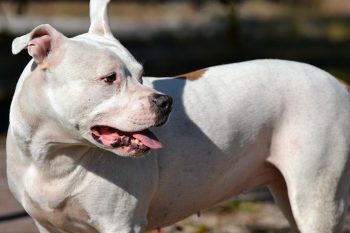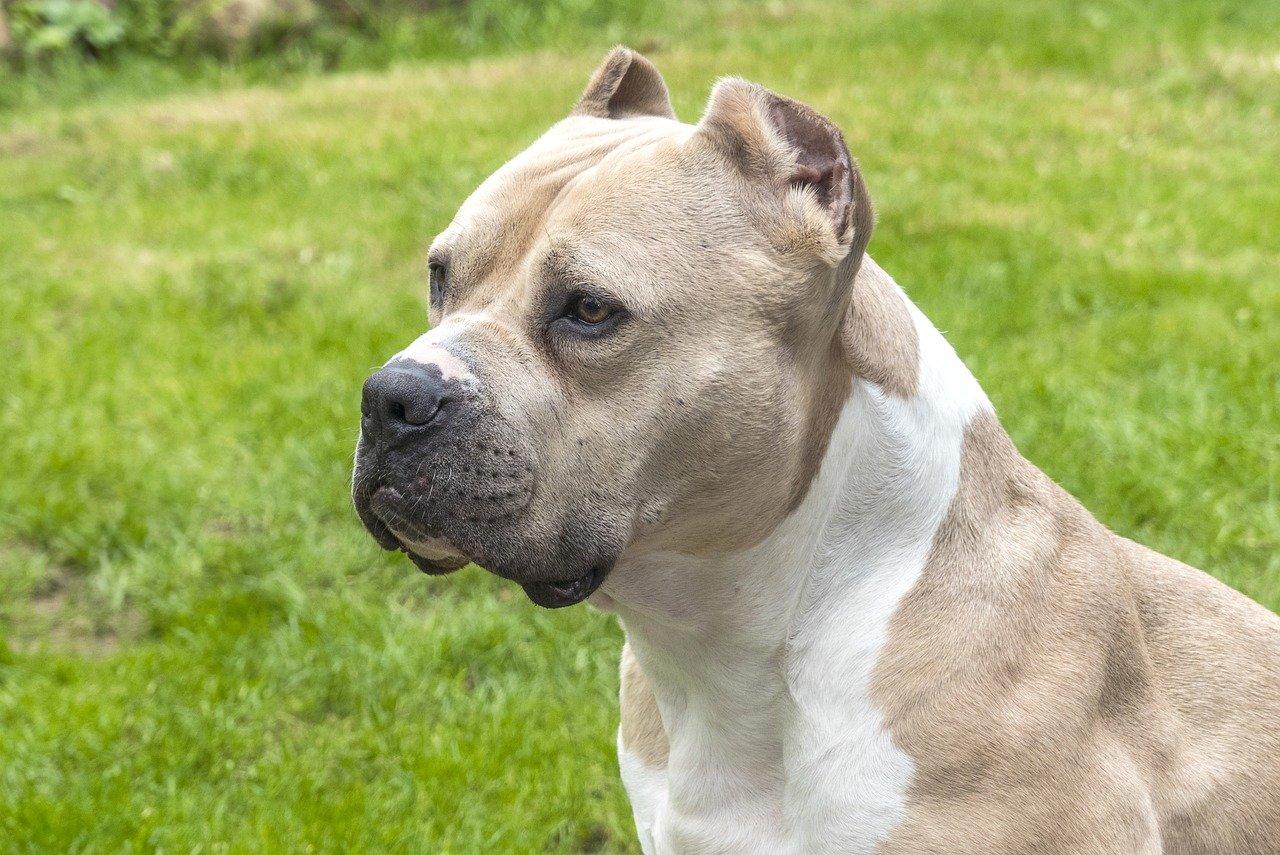
Pit Bulls carry a reputation that often precedes them, a mix of myth and misunderstanding. However, beneath the stern exterior and media-created persona, lies a temperament filled with affection, loyalty, and intelligence.
1. Loyalty
Pit Bulls are steadfastly loyal. Their allegiance to their family is unparalleled, making them fantastic companions willing to go to great lengths to protect their loved ones.
2. Affectionate Nature
Contrary to popular belief, Pit Bulls are incredibly affectionate and loving towards their human family members. They’re known for their playful, gentle demeanor, especially with children, making them excellent family pets when socialized correctly.
3. High Intelligence
As a breed, Pit Bulls are extremely intelligent. This cognitive ability allows them to be highly trainable, as they can quickly grasp commands and instructions, making them suitable for various roles, from service dogs to therapy animals.
4. Energetic and Playful
Pit Bulls possess a high energy level and love engaging in play and physical activities. Their playful spirit makes them entertaining companions, although it also means they require regular exercise to maintain their mental and physical health.
5. Determination
A notable trait of Pit Bulls is their determination. Once they set their minds to a task, they pursue it with diligence and commitment, which also implies that they respond well to consistent, structured training regimes.
6. Sensitivity
Despite their tough exterior, Pit Bulls are sensitive creatures. They are attuned to their owners’ moods and emotions, offering comfort and companionship during difficult times, which underscores their empathetic nature.
How Does a Male Pit Bull Temperament Compare to a Female
Pit Bull?
Male Pit Bull Temperament
Male Pit Bulls are often larger and more muscular than their female counterparts, displaying a dominant and confident demeanor. They are typically energetic, playful, and at times, assertively protective of their owners and territory.
1. Dominance: Male Pit Bulls tend to be more dominant. This characteristic makes early and consistent training crucial to curb undesirable aggressive behaviors. When socialized properly, their dominant trait can be channeled into protection and loyalty towards their family.
2. Energy Levels: Males usually possess higher energy levels, requiring more exercise and playtime to keep them happy and healthy. Engaging them in activities that challenge them physically and mentally helps in maintaining their well-being.
3. Territorial Behavior: Male Pit Bulls might display more territorial behaviors. While this trait can make them excellent guard dogs, it’s also essential to socialize them early to ensure they can differentiate between a threat and a harmless visitor.
Female Pit Bull Temperament
Female Pit Bulls, while equally loyal and affectionate, may display a temperament that is somewhat calmer and more nurturing than males. They are also highly intelligent and trainable, making them excellent companions.
1. Maternal Instinct: Females often exhibit a maternal instinct, even if they aren’t mothers. This trait makes them nurturing and caring towards their human family members, providing comfort and support when needed.
2. Independence: While both sexes are independent, females might be more self-sufficient and content with spending time alone. However, they still crave love and affection from their owners.
3. Less Territorial: Though protective, females might be less territorial than males. With proper socialization, they can be welcoming to strangers and other animals, making them suitable for households with multiple pets.
Frequently Asked Questions about a Pit Bull’s Temperament and Personality

- Are Pit Bulls naturally aggressive?
- No, Pit Bulls are not naturally aggressive. Like any breed, their behavior is shaped by their upbringing, training, socialization, and treatment. It’s essential to differentiate between protective instincts and aggression.
- How do Pit Bulls behave around children?
- When properly socialized and trained, Pit Bulls can be gentle, patient, and affectionate around children. However, as with any dog breed, interactions between dogs and young children should always be supervised.
- Are Pit Bulls loyal to their owners?
- Yes, one of the standout traits of Pit Bulls is their deep loyalty to their owners. They form strong bonds with their families and are often eager to please.
- Do Pit Bulls get along with other dogs?
- This varies from one individual to another. Some Pit Bulls get along well with other dogs, especially if they’ve been socialized early on. Others might show dog-on-dog aggression, which emphasizes the importance of early and continuous socialization.
- Are Pit Bulls good for first-time dog owners?
- While Pit Bulls can be great companions, their strength and energy might pose challenges for first-time dog owners. It’s essential to understand their needs and be prepared for consistent training and socialization.
- Do Pit Bulls have a high energy level?
- Yes, Pit Bulls are energetic and require regular exercise to maintain their mental and physical health. Daily walks, playtime, and mental stimulation are vital for their well-being.
- Are Pit Bulls intelligent?
- Absolutely! Pit Bulls are highly intelligent, which makes them quick learners. Their intelligence also means they require mental stimulation to prevent boredom.
- How do Pit Bulls respond to training?
- Pit Bulls are eager to please and respond well to positive reinforcement training methods. Consistency, patience, and early training are key components to their behavioral development.
- Are Pit Bulls protective of their owners?
- Yes, their loyalty often translates into a protective instinct. While they can be loving family members, they might be wary of strangers or perceived threats.
- Do Pit Bulls require a lot of socialization?
- Yes, like all dogs, early and consistent socialization is crucial for Pit Bulls to ensure they grow into well-adjusted and sociable adults.
- Can Pit Bulls live in apartments?
- While they can adapt to apartment living, it’s essential to provide them with ample exercise and stimulation due to their high energy levels.
- Are Pit Bulls hypoallergenic?
- No, Pit Bulls are not hypoallergenic. They do shed, so regular grooming is recommended to manage shedding and maintain their coat’s health.
- Are male Pit Bulls more aggressive than females?
- Temperament varies more with individual dogs and their upbringing than with gender. Both males and females can be equally affectionate and loyal, but early neutering or spaying can help in managing certain aggressive tendencies.
- Are Pit Bulls good guard dogs?
- Their protective nature and loyalty can make Pit Bulls effective guard dogs. However, they should be trained properly to differentiate between regular visitors and potential threats.
- How do Pit Bulls handle being alone?
- Like many breeds, Pit Bulls can develop separation anxiety if left alone for extended periods. It’s crucial to gradually acclimate them to alone time and provide toys and stimulation to keep them occupied.
What Kind of Person Is a Good Fit for a Pit Bull?
 Pit Bulls are robust, intelligent, and loyal dogs that make excellent companions for the right individuals or families. Understanding the breed’s characteristics and needs is fundamental in determining if a Pit Bull is a good fit for you. Below are key traits and lifestyle factors that align well with owning a Pit Bull.
Pit Bulls are robust, intelligent, and loyal dogs that make excellent companions for the right individuals or families. Understanding the breed’s characteristics and needs is fundamental in determining if a Pit Bull is a good fit for you. Below are key traits and lifestyle factors that align well with owning a Pit Bull.
-
Active Lifestyle
- Pit Bulls are energetic and require daily exercise to maintain their physical and mental health. Individuals who lead active lives and can provide ample playtime, walks, and physical activities are ideal for these dynamic dogs.
-
Patient and Consistent
- Consistency and patience are crucial when training and socializing Pit Bulls. Owners should be willing to invest time and effort into proper training, using consistent commands and positive reinforcement techniques.
-
Experienced Dog Owner
- While not mandatory, experience with dogs, particularly with breeds that are strong and assertive, can be beneficial. Experienced owners might find it easier to establish dominance and navigate the challenges of training and socialization.
-
Committed to Socialization
- Early and continuous socialization is essential for Pit Bulls. Owners should be committed to exposing their dogs to different environments, people, and animals to develop a well-adjusted and sociable pet.
-
Understanding of the Breed
- Being knowledgeable about Pit Bulls’ traits, needs, and common misconceptions helps in providing appropriate care and advocacy for the breed. Educated owners can also contribute to improving the breed’s public perception and acceptance.
-
Responsibility
- Responsible ownership involves adhering to local laws and regulations concerning the breed, providing regular veterinary care, and ensuring the dog’s safety and the safety of others.
The ideal Pit Bull owner leads an active lifestyle, is patient and consistent, understands the breed’s needs, and is committed to responsible and informed ownership. Recognizing and aligning your traits and lifestyle with the needs of a Pit Bull is crucial for
The post Pit Bull Temperament: What’s a Pit Bull’s Personality Like? appeared first on iHeartDogs.com.
via Whisker Therapy